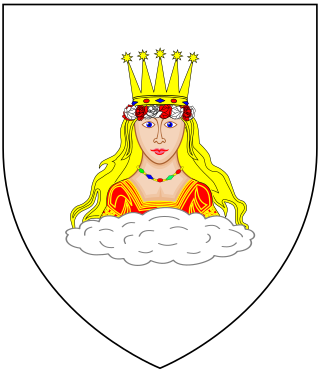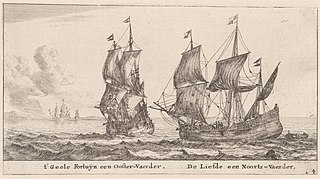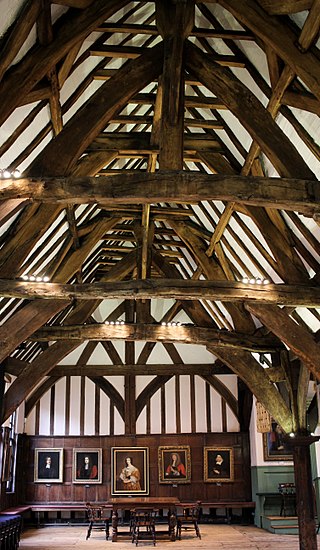
The Worshipful Company of Mercers is the premier Livery Company of the City of London and ranks first in the order of precedence of the Companies. It is the first of the Great Twelve City Livery Companies.

John Guy was an English merchant adventurer, colonist and politician who sat in the House of Commons from 1621 to 1624. He was the first proprietary governor of Newfoundland Colony, the first attempt to establish a colony on Newfoundland.

The Royal African Company (RAC) was an English trading company established up in 1660 by the House of Stuart and City of London merchants to trade along the West African coast. It was overseen by the Duke of York, the brother of Charles II of England; the RAC was founded after Charles II ascended to the English throne in the 1660 Stuart Restoration, and he granted it a monopoly on all English trade with Africa. While the company's original purpose was to trade for gold in the Gambia River, as Prince Rupert of the Rhine had identified gold deposits in the region during the Interregnum, the RAC quickly began trading in slaves, which became its largest commodity.

The Muscovy Company was an English trading company chartered in 1555. It was the first major chartered joint-stock company, the precursor of the type of business that would soon flourish in England and finance its exploration of the world. The Muscovy Company had a monopoly on trade between England and Russia until 1698 and it survived as a trading company until the Russian Revolution. Since 1917, the company has operated as a charity, now working within Russia.

A guildhall, also known as a "guild hall" or "guild house", is a historical building originally used for tax collecting by municipalities or merchants in Great Britain and the Low Countries. These buildings commonly become town halls and in some cases museums while retaining their original names.
Ralph Fitch was a gentleman merchant of London and one of the earliest British travellers and merchants to visit Mesopotamia, the Persian Gulf, Indian Ocean, South Asia & Southeast Asia. At first he was no chronicler but he did eventually write descriptions of the Southeast Asia he saw in 1583–1591, and upon his return to England, in 1591, became a valuable consultant for the English East India Company.

Richard Chancellor was an English explorer and navigator; the first to penetrate to the White Sea and establish relations with the Tsardom of Russia.

The London and Bristol Company came about in the early 17th century when English merchants had begun to express an interest in the Newfoundland fishery. Financed by a syndicate of investors John Guy, himself a Bristol merchant, visited Newfoundland in 1608 to locate a favourable site for a colony. Upon his return to England 40 people applied for incorporation as the Tresurer and the Companye of Adventurers and planter of the Cittye of london and Bristoll for the Collonye or plantacon in Newfoundland. The company was known as the London and Bristol Company or simply the Newfoundland Company.
The Company of Merchant Adventurers to New Lands was an early joint stock association, which began with private exploration and enterprise, and was to have been incorporated by King Edward VI in 1553, but received its full royal charter in 1555. It led to the commencement of English trade with Russia, Persia and elsewhere, and became known informally, and later formally, as the Muscovy Company.
A chartered company is an association with investors or shareholders that is incorporated and granted rights by royal charter for the purpose of trade, exploration, and/or colonization.

The Eastland Company, or North Sea Company, was an English crown-chartered company, founded in 1579 to foster trade with Scandinavia and Baltic Sea states. Like the better-known Russia Company, this was an attempt by the English to challenge the Hanseatic League's dominance in the commerce of northern and central Europe.
The Somers Isles Company was formed in 1615 to operate the English colony of the Somers Isles, also known as Bermuda, as a commercial venture. It held a royal charter for Bermuda until 1684, when it was dissolved, and the Crown assumed responsibility for the administration of Bermuda as a royal colony.
Merchant Taylors' School may refer to:

The Company of Merchant Adventurers of London was a trading company founded in the City of London in the early 15th century. It brought together leading merchants in a regulated company in the nature of a guild. Its members' main business was exporting cloth, especially white (undyed) broadcloth, in exchange for a large range of foreign goods. It traded in northern European ports, competing with the Hanseatic League. It came to focus on Hamburg.
Edward Misselden was an English merchant, and leading member of the writers in the Mercantilist group of economic thought. He argued that international movements of money and fluctuations in the exchange rate depended upon the international trade flows and not the manipulations of the bankers, which was the popular view at the time. He suggested that trading returns should be established for purposes of statistical analysis, so that the state could regulate trade with a view to obtaining export surpluses.

The Merchant Adventurers' Hall is a medieval guildhall in the city of York, England. It is a Grade I listed building and scheduled ancient monument.
Nathaniel Rich may refer to:
African Company may refer to:
David or Dave Lewis may refer to:
An adventurer is a person who adventures.
This page is based on this
Wikipedia article Text is available under the
CC BY-SA 4.0 license; additional terms may apply.
Images, videos and audio are available under their respective licenses.









